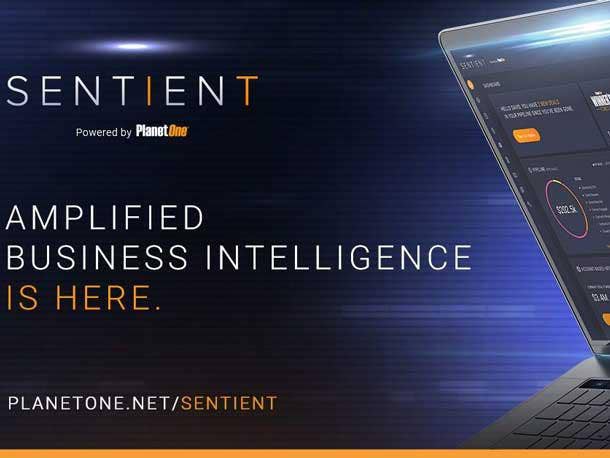PlanetOne: Sentient Platform Closes ‘Grand Canyon’-Sized Gaps In Partner-Supplier Communication
“The breakdown in gaps in communication in the channel ecosystem have been an Achille’s heel in the industry … nobody had ever built the platform to [let] the entire ecosystem see, touch and feel real-time business intelligence, without any heavy lifting,” PlanetOne leaders say of its “game-changing” Sentient platform.

‘A Labor Of Love’
Master agent PlanetOne spent the last 18 months making its vision for an all-inclusive, analytics-powered partner/supplier/master agent communication platform come alive. The result? Sentient.
Sentient, a “game-changing” AI-based platform, is now generally available to all PlanetOne partners after the company this week completed a beta program with a handful of partners. Sentient was designed in-house and offers PlanetOne partners real-time visibility and account-based business intelligence across their existing base of customers and prospects. MSPs and agents can use the platform starting at deal inception, all the way to post-sale project management, Ted Schuman, Scottsdale, Ariz.-based PlanetOne’s CEO, told CRN.
Schuman, along with his son and Vice President of PlanetOne Jake Schuman, who has been intimately involved in the development of Sentient since its inception, sat down with CRN for an exclusive conversation on the creation and goals of the platform, how it’s putting pressure on competing master agents and distributors, and what PlanetOne partners can immediately expect.
Here’s what PlanetOne’s leaders had to say about Sentient.

How will Sentient close the communication gap between suppliers and partners?
Jake: Sentient is amplified business intelligence. We’re connecting a partner into every single aspect of their own business and allowing them to harness that data to make decisions and drive more efficiencies in their business [so they can] create more revenue opportunities and go out and ultimately be more successful.
In the channel community, if you look at our landscape, you have a customer, a partner, a vendor, and a sourcing partner, like a PlanetOne. In any opportunity, you’ll have four different parties that are involved in that one engagement. And those parties historically have never been connected. There’s a bunch of data that’s happening in those individual silos, but they’ve never talked. And the admission and the goal of Sentient was to take all of those four parties and connect them together and provide one experience in a single pane of glass for our partners and providers [who can] harness that data for all those parties. That was the starting point of Sentient, and the challenge we went out to [take on].
Ted: The breakdown in gaps in communication in the channel ecosystem have been the Achille’s heel in the industry — the gaps have been as big as the Grand Canyon. Nobody’s ever solved that problem of having timely, accurate and painless methods to communicate [between partners and suppliers]. Just looking at just the most basic of questions, “When is my account going to be active? When will I be paid?” Super simple stuff — maybe it’s a billing question for a current customer. The amount of phone calls, emails, and heavy lifting required to answer the simplest of day-to-day questions is exhausting. Master agents for years have provided some heavy lifting in that regard. But nobody had ever built the platform to [let] the entire ecosystem see, touch and feel real-time business intelligence, without any heavy lifting. Sentient solves that problem. It’s a one-of-a-kind, industry-first platform that enables and connects all of the players involved in the entire customer and partner experience.

What does the Sentient platform have that other master agent platforms don’t?
Jake: For PlanetOne, our differentiator has been around that white glove service, that high-touch engagement style, and how, when a partner comes on board with us, they are plugged into a support pod — what we call it internally. That’s a group of five to seven people that are dedicated to their partnership. With every single engagement, the pod is engaged. So, when we look at an engagement cycle, [we start] at the very beginning of an opportunity. A partner brings that to us, and we go through what we consider a pipeline — that’s the pre-sales process. Then we win the deal, and it goes into project management. Then it goes through the installation process. Then it’s activated, and it goes into commissions.
Essentially, what the differentiator is [with regard to] the platform is that we have directly integrated every aspect in every deal in our partners’ businesses. We have that data, and it was our mission to take that data and to integrate it into a platform where a partner could log into that, and on their own, deep dive into every single aspect of their business. [It’s really] being able to make decisions and make moves off of that. [We’re] taking the data and bringing it to our partners’ fingertips in real-time, whenever wherever they need it. We believe that none of our competition can provide that differentiator — it’s been the differentiator for PlanetOne one for 30 years. Essentially, now we’re taking our core differentiator and putting it into a platform and letting our partners access it in real-time.
Ted: Our peers have had some good innovation over the years, but they’ve all mostly addressed a specific application a significant price, like local access quoting or qualifications to a product or service. Nothing is nearly as vast or expansive as addressing the entire business model, from literally pre-sales, project management, commissioning, and upselling and cross-selling opportunities.

What kinds of tools are brand new that partners didn’t have access to before?
Jake: There’s three features that we want the partner community to realize that is the power of Sentient. The first is around amplified business intelligence — real-time actionable analytics in every part of the lifecycle of a customer, from quote to cash. No more Excel spreadsheets, no more manual communication. A true single pane of glass for every aspect of their business. All of that data is just like right in front of them. Once we have those analytics, that’s when we can take that dial and turn up to 11.
Tools are number two. Basically, we’re layering those on top of the analytics to provide enhance and amplify experience. The first tool that we’re going to market with is called Atlas, it’s a fiber and network mapping tool. The second one is Amplify for account-based intelligence. So essentially, we go out, and we find a bunch of Intel and spend out there in our partners’ customers base and then we tell [partners] where that spend is so they can cross sell, and upsell, and go find more of revenue streams within their own customer base. The third one that we’re launching is a co-branded marketing tool. Essentially, it’s marketing as a service.
Then, number three, is our support pods. We’re calling that people-enhanced automation. We’re connecting our support pods directly into Sentient so when a partner logs in, they can instant message their entire pod — all of their project managers, engineers, you name it — they’re just immediately connected.

What are PlanetOne’s future plans for the Sentient platform?
Jake: It’s been a labor of love. What we have launched [this week] was version one. Building the Sentient platform that we can expand on was the most important thing. Version two, three, and four, will be arguably just as big and exciting for our company and our partners. In building this platform, we can really add some amazing tools on top of it. The things to expect are going to be game changers for the industry. They’re coming in the future releases and iterations. Sentient is not going to be a platform that we’re going to launch and keep static. Partners can expect continued investment from PlanetOne and tool sets that are going to be available to them. And since this is a proprietary platform that we’ve built from the ground up, there are unlimited potential ideas and sets of functionalities that we can throw out there.